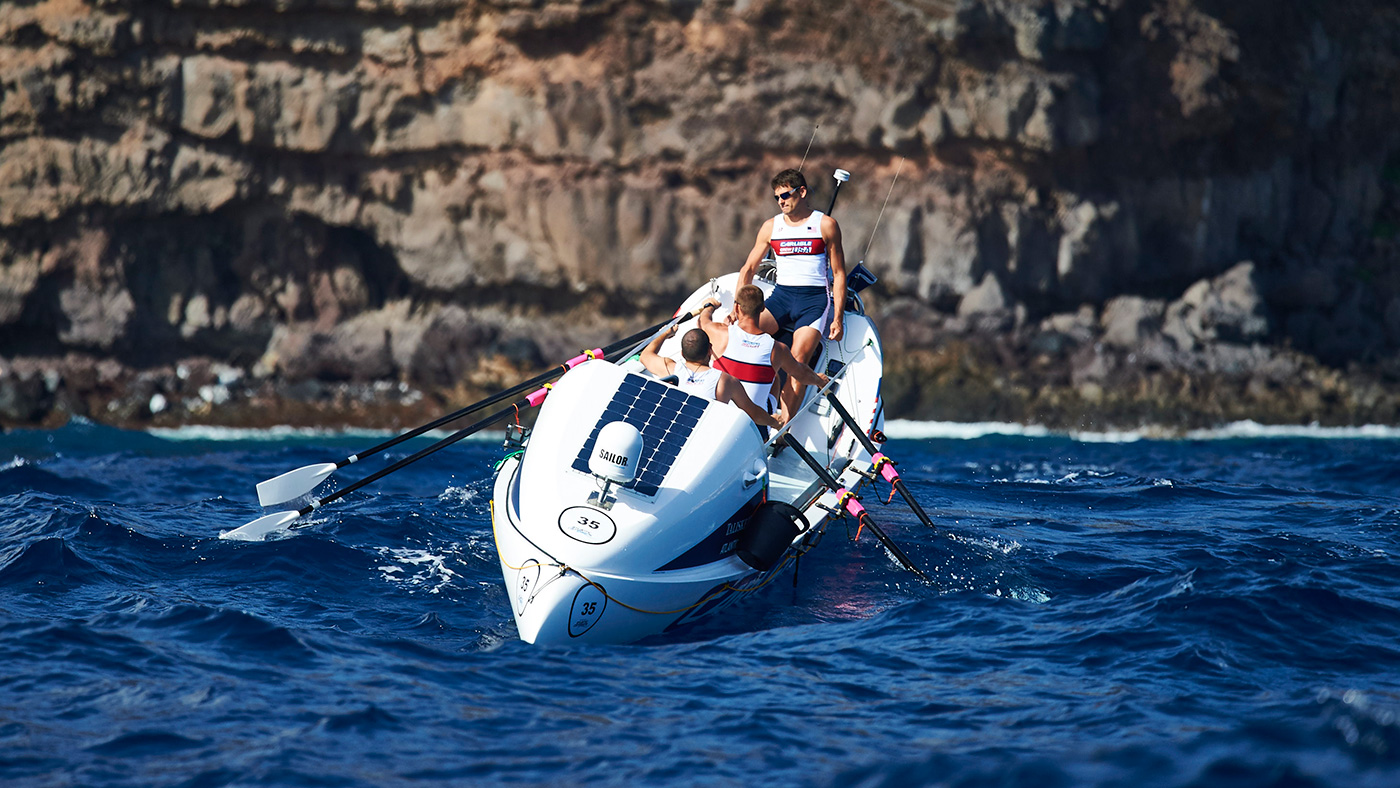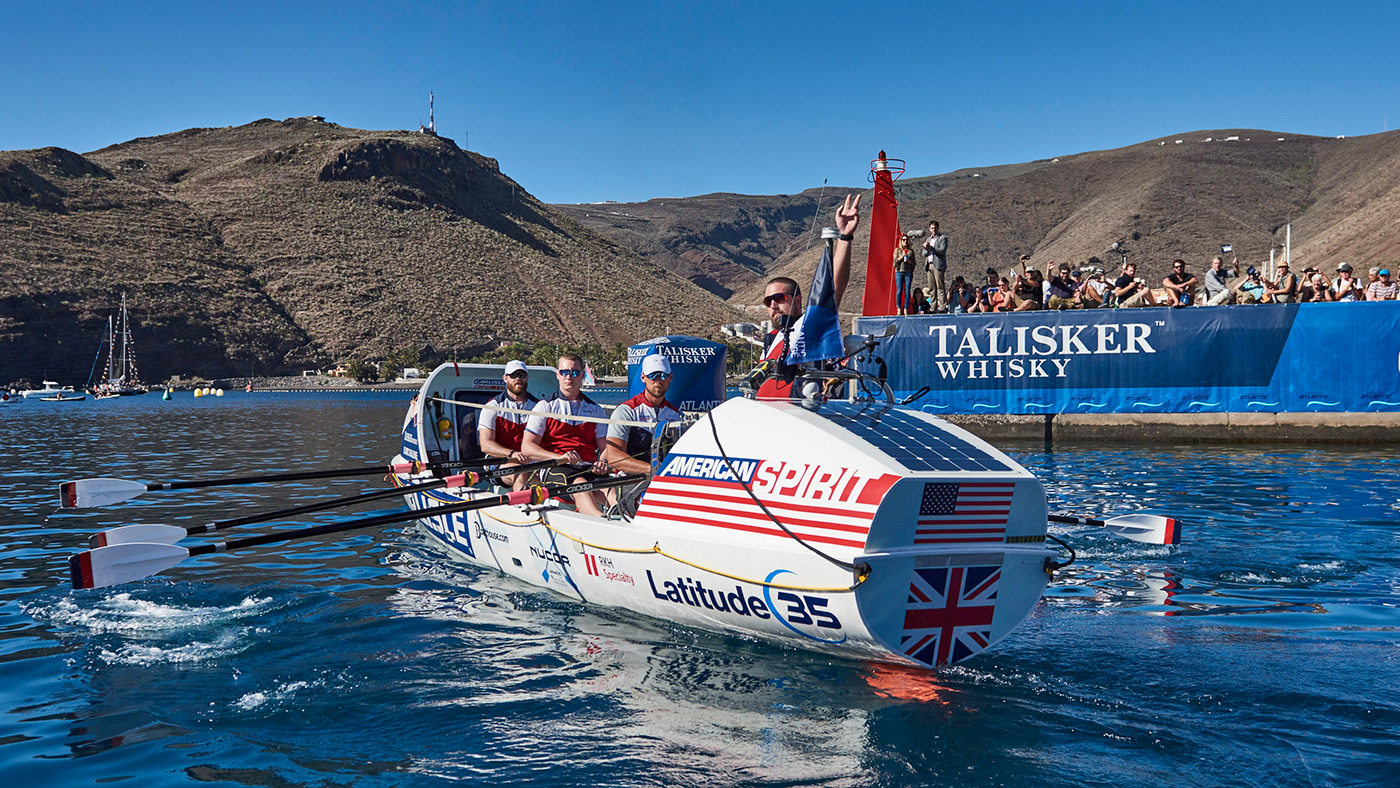Talisker Whisky Atlantic Challenge: A rite of passage
While most of us overindulged at Christmas, rowers were racing across the Atlantic. Head duty officer Ian Couch has been monitoring them
A free daily email with the biggest news stories of the day – and the best features from TheWeek.com
You are now subscribed
Your newsletter sign-up was successful


On 14 December, 12 rowing boats – crewed by teams of two, three and four, as well as four solo rowers – set off from La Gomera in the Canary Islands towards Antigua in the Caribbean. The winners are expected to arrive in mid-January, with the rest coming in, one by one, for at least a month afterwards. Another duty officer and I are keeping tabs on them 24/7 and are available to advise, encourage and troubleshoot problems with them.
They are in small boats, low to the water, and the Atlantic can produce huge waves. Big storms are hairy – especially at night, when it's dark and loud. The crews should expect to capsize at some point on the journey (although we've had years where no one rolled) but the watertight cabins and boat design mean they right themselves. Anyone rowing at the time will go under, but they are required to be harnessed to the boat so they should never be parted from it.
In extreme weather, they can take cover in the cabin, but personally I preferred being out there in my foul-weather clothes, seeing what was coming rather than being thrown against crewmates in an overheated box – that's horrible. Once you're well into the race, you actually welcome big seas because the prevailing winds are north-easterly trades – in theory, if they didn't row, they'd arrive somewhere in the Caribbean after about 150 days. Good weather in the Atlantic is a 30ft rolling swell, which picks you up and throws you along at 15 knots. A bad day is a still one in baking sun, when it feels as if you're rowing through concrete. That's soul-destroying.
The Week
Escape your echo chamber. Get the facts behind the news, plus analysis from multiple perspectives.

Sign up for The Week's Free Newsletters
From our morning news briefing to a weekly Good News Newsletter, get the best of The Week delivered directly to your inbox.
From our morning news briefing to a weekly Good News Newsletter, get the best of The Week delivered directly to your inbox.
Much of our communication is supplying weather reports and acting as a technical helpdesk. The rowers have to fix problems themselves. We have two support yachts out there but if they hand over a single screwdriver or bottle of water, the boat is disqualified from the race, although it can complete the challenge. It is the difference between getting across but being disqualified or being rescued and losing your boat.
The biggest part of my role is pastoral, which you can't separate from safety. No matter how much I tell the competitors in the pre-race briefings, they are only now, in the middle of the race, coming to understand the highs and lows. I tell them to be over-prepared pessimists, not shocked optimists. As part of the mandatory training before being allowed to take part, we go through all the worst-case scenarios – serious injury or illness, loss of power and vital systems, loss of communications etc – and how to deal with them. We don't want the first time they encounter that problem to be out in the middle of the Atlantic.
No matter how well prepared they are, they are sometimes tired, scared, hungry, seasick and dehydrated and can let their essential routines slip. For example, they have to maintain the solar panels and the water-desalination unit daily. They need to keep their toilet bucket clean as well as themselves – if you get a sore on your backside, you can't man up and push through it. It'll only get worse and you'll fall apart. You have to treat it and let it heal before you can carry on.
It can lead to them questioning the reason they're out there. Over the years, we've had calls from competitors saying: "I have to finish, or get off the boat, because of X, Y or Z" - they cannot fix the water-maker or their injuries become much more serious; any reason other than quitting. We have to judge it and occasionally deliver some tough love because, if they get off the boat, they'll regret it forever – all that time, money, sacrifice and emotional investment lost because it turned out to be hard, which was why they embarked in the first place and is what makes it so worthwhile. People we talked out of quitting last year cursed us at the time but were so grateful when they completed the challenge.
A free daily email with the biggest news stories of the day – and the best features from TheWeek.com

This is an extraordinary feat. More people climb Everest in a year than have ever rowed the Atlantic. And there is room for new ideas and approaches to transform the sport and scope for records to be achieved. Newcomers can shape this sport so if you approach it with positivity, there is great reward to be had. The overall race record is 37 days but that could be under threat this year, the way the two leading boats – Latitude 35 and Row For James – are jockeying for position.
Above all, it is an utter privilege to be out on that ocean – if you took a thousand photos, one of them might come close to capturing the grandeur. When I did it, we often had pods of dolphins accompanying us, especially at dawn and dusk. It's a whale migration route – I once had my rudder taken off by one. Flying fish leap over the boat. There are sea turtles and marlin – one boat got a spike through the hull (they were able to patch it but the marlin lost his spike). You can catch fish – some people have taken limes and Tupperware to make ceviche. However, we do not put anything other than biodegradable material into the water – the boats are inspected at the end and there are severe penalties for jettisoning any empty food packaging, for example.
The Milky Way at night is just one huge band of light because there is no light pollution whatsoever. And you see space debris constantly flying across the sky. Even though your boat is the highest conducting thing for miles, lightning is still stunningly beautiful. And the sea itself is always changing colour and texture. Finally, it's very exciting when you start seeing different cloud formations and birds in the water that indicate you're getting close to land. Then you can smell it and see light at night. The relief and elation on finishing is huge – and English Harbour in Antigua is a great place to celebrate.
To follow the progress of the Talisker Whisky Atlantic Challenge, go to taliskerwhiskyatlanticchallenge.com
IAN COUCH spent 18 years in the British Army before the first of his three ocean rows – he resigned his commission the day after he finished. As well as two Atlantic Challenges, he was in the first crew to row from Australia to Mauritius. He has set a British record for crossing Greenland on skis and running across the Gobi desert
-
 Will increasing tensions with Iran boil over into war?
Will increasing tensions with Iran boil over into war?Today’s Big Question President Donald Trump has recently been threatening the country
-
 Corruption: The spy sheikh and the president
Corruption: The spy sheikh and the presidentFeature Trump is at the center of another scandal
-
 Putin’s shadow war
Putin’s shadow warFeature The Kremlin is waging a campaign of sabotage and subversion against Ukraine’s allies in the West